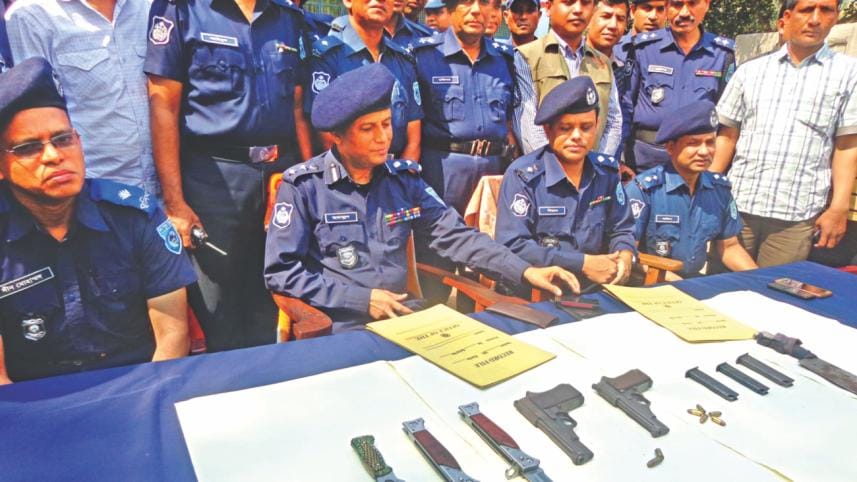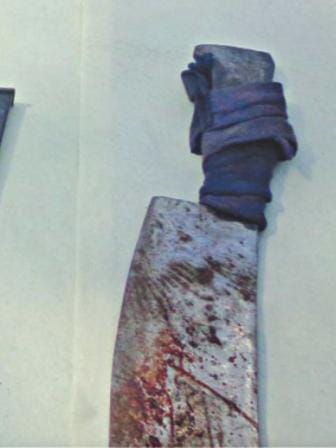'Breakthrough' in priest killing

Five days into the murder of a Hindu priest in Panchagarh, police yesterday claimed to have "completely cracked" the case and arrested three "key suspects".
Those arrested include the one who had slit the priest's throat at a temple in the country's northernmost district on February 21, police claim.

"We have been able to completely crack the case just in five days. Three of the five suspects directly involved in the murder were arrested following several raids last night [Thursday night]," said Deputy Inspector General Humayun Kabir of Rangpur police range yesterday.
All three arrestees were members of the banned militant outfit Jama'atul Mujahideen Bangladesh, he told journalists at Debiganj Police Station in Panchagarh.
He, however, did not disclose the identities of the three "for the sake of investigation".
The fresh arrests take the number of those detained over the incident to six.
Two more suspects are on the run and police hope to arrest them soon, said the DIG.
Asked about the motive, Humayun Kabir said the militant group wanted to intimidate the people of minority communities and create instability in the country.
Criminals slit the throat of Jogeswar Dasadhikari, 50, a priest of Sri Sri Shonto Gaurio Temple at Debiganj's Sonapota, on the early morning of February 21.
Two devotees were injured as the criminals fired shots and exploded homemade bombs while fleeing. The injured are now under treatment at Rajshahi Medical College Hospital.

QUESTIONS OVER MACHETE
Some weapons -- including a Japanese 9mm pistol, a US-made pistol of 7.65 bore, three cocktails, five bullets, three magazines, two knives and a blood-stained machete -- were displayed on a table to the media during the briefing.
The DIG claimed those were used in the murder.
However, the blood stains on the machete still looked red. Under normal circumstances, the stains should have dried up and blackened by now.
When journalists asked the DIG about it, Humayun Kabir dodged the question.
Immediately after the murder, police claimed to have recovered a blood-stained machete from the crime scene.
To know if the knife shown during yesterday's briefing was a new one, this newspaper made several calls to the DIG and Gias Ahmed, superintendent of police of Panchagarh district. But neither of them answered the calls.
However, a source in the local police said the machete showed to journalists was the one recovered from the murder scene.
Asked why the blood stains on the machete were still fresh, he said the machete "was preserved under special arrangements".
He would not say what the "special arrangements" were.
The source requested anonymity as he was not authorised to talk to the media about the issue.
On the other hand, DIG Humayun Kabir last night told BBC Bangla that the machete was recovered during the raids the night before.
NO DETAILS ON RAIDS
A day after the murder, police said they had arrested three suspects -- Khalilur Rahman, 45, Babul Hossain, 30, and Jahangir.
The three were put on a 15-day remand on Tuesday in two cases including the murder case filed by the victim's family. The other case was filed by police over illegally possessing firearms and explosives.
Based on information gleaned from them, police conducted the raids on Thursday night and arrested the three "key suspects", said DIG Humayun Kabir at the press briefing yesterday.
Asked where exactly the raids were conducted, he refused to give details.
The chief of Rangpur range police went on to claim that police seized a bicycle used by some of the attackers to keep an eye on the area when the priest was being murdered.
However, the red motorcycle of Bajaj brand used by the killers could not be found yet, he added.
PROTESTS ON
Bangladesh Jatiya Hindu Mohajot yesterday formed a human chain in front of the Jatiya Press Club in the capital, demanding capital punishment for the killers of the priest.
They also brought out a procession that marched the nearby streets.
The platform demanded that the government form a permanent commission for conducting investigations into attacks on the members of ethnic and religious minorities in the country.




 For all latest news, follow The Daily Star's Google News channel.
For all latest news, follow The Daily Star's Google News channel.
Comments